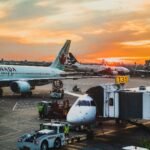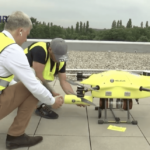The selection of Eamonn Brennan in the summer of 2017 to lead Eurocontrol signaled a meaningful change at the Brussels-based intergovernmental organization that coordinates the air traffic control system of over 40 states across Europe. The choice of Brennan, who at that time served as the CEO of the Irish Aviation Authority, broke with the long-standing tradition of nominating a candidate from one of the big four Eurocontrol members: France, Germany, Spain, and the UK. During his tenure, Brennan implemented a major reset of Eurocontrol, its workings, and its role in European aviation, as air transport movements reached a new record of 11.1 million in 2019 and then retracted to almost zero during the Covid pandemic. Brennan’s term ends on January 1, 2023, when Spain’s civil aviation authority director general Raúl Medina Caballero assumes the post.
Brennan reflected on his tenure at the helm of Eurocontrol during an interview with AIN ahead of the Farnborough Air Show.
You have profoundly changed the dynamics of Eurocontrol from a rather dull, static organization to a crucial organization at the center of European aviation. Why did you implement this repositioning?
The main thing I sought to achieve in Eurocontrol is to make it serve the industry, the airports, airlines, states, air navigation service providers, and not itself. I sought to bring it back to the center of aviation and embed an attitude of service. Because Europe is a fragmented system you need to have a neutral organization whose sole function is to join it all together. That is what I tried to reintroduce in Eurocontrol. I tried to get the network management correct, to get the data correct, to get the sustainability correct and to get the coordination with the industry correct. For me, the change that I tried to do was to make Eurocontrol an aviation organization and not just an air traffic control organization. I received great support from across all stakeholders.
Have we learned lessons from the pandemic?
I would worry that we’ll have another occurrence of the pandemic this winter. While we worked together to pull aviation together with a single attitude, I think the governments in the European Union treated the pandemic as 27 separate solutions with differing rules on social distancing, where and when to wear face masks; some imposed FFP2 mask [mandates] and others not, and so on. We had a single virus; we should have had a single response. And I think that this is where the national governments have to mandate the European Commission more to have a larger role in this going forward.
Demand for air travel is rebounding after Covid-19, but there are disruptions, flight cancellations and delays, and chaos at airports across Europe. How can this happen? Did the industry fail to forecast the right traffic recovery or fail to properly prepare?
There were flight forecasts and the Eurocontrol predictions for the recovery were accurate within 1 percent. So, the airlines, I feel, delivered and recovered very quickly. The problem is that the airports lost a lot of staff during the pandemic, and they lost lower-paid staff. They have found other jobs where they don’t have to be trained that much and don’t have to wake up at 2 am. Going forward, we have to realize that the main objective of an airport is to move passengers through to flights, not to have them buy stuff in shops. If staff needs to be paid better they need to be paid better. The ground handling liberalization has not been that helpful because it has lowered it so low that you can’t get staff.
The average delay in the first five months has already reached 2019 levels despite the number of flights amounting to only 75 percent of 2019. And that was before the summer. Will the situation get better?
We are doing a lot to mitigate the delays; we are much more proactive than we used to be. For instance, we divert aircraft and we implement flight plan changes. But there are two big issues for the moment: One is the Russian–Ukraine situation with military operations very much restricting air space for civil use in several parts of Europe, including Poland. The second issue is that we can’t put aircraft through the air space of the Russian Federation [owing to EU sanctions] so we have to reroute them to Slovakia and Romania, which means we now have heavy aircraft in air space where they shouldn’t be. That is causing a jam at a moment that summer traffic is rising. So we are looking at a very difficult ATC summer and delays will be worse this summer; there is no doubt about that.
The lack of progress in moving the Single European Sky (SES) forward is old news. Maybe it is time to scrap the SES and put forward a new project or approach?
I would not go as far as to say scrap it yet, but I am very frustrated with the progress. The SES has been on the books for 20 years. The blocking point [in adopting the European Commission’s legislative proposals] lies with the states; it does not matter how you rebrand it. The reality is that Europe is a small amount of air space. The proposal that was on the table was to have seven air traffic control centers for Europe. We now have 62. The situation has fragmented and has gotten worse. If you travel between Sweden and Greece by road, nobody checks you. But if you do that in the air, you have multiple centers, you have multiple checks, different frequencies. The whole thing is not easy to manage.
How do you convince the states about the benefits of implementing the SES?
The biggest driver is going to be sustainability. European states could save 10 percent in CO2 emissions if they implemented the SES and the fact that they don’t is actually contributing to CO2 emissions. They are causing a problem, and on the other hand they tax airlines for their emissions through the EU emissions trading scheme and CORSIA. They really need to get their act together. The second driver is technology. Maybe once this was a technological argument, but now there is none. We have cloud systems. You do not need 62 air traffic control centers.
But states for sure do not want to lose the revenues they generate from having aircraft flying in their air space? The charges billed to European air space users pre-Covid totaled about €8 billion per year.
I am sure we can come up with a financial package to compensate states that would lose revenue by making the system more efficient.
You have decided not to prolong your mandate with a further five-year term. You will hand over the DG position on January 1. What do you advise your successor?
Remember that Eurocontrol serves the stakeholders. That is the most important thing. Stay focused on delivery. Eurocontrol has great staff and is not a political organization.

via Ainonline https://ift.tt/msZrpkR



